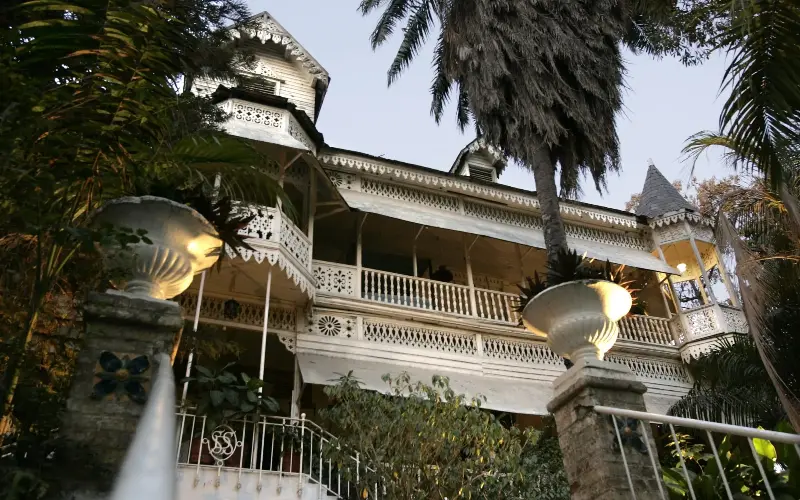
Haiti’s famed gingerbread hotel that inspired the novelist Graham Greene was burned down by gangs as the country plunged further into crisis.
Once a presidential palace, the storied Hotel Oloffson was built at the end of the 19th century and had survived coups, dictatorships and the 2010 earthquake.
But the hotel manager Richard Morse has confirmed the Port-au-Prince landmark visited by stars including Mick Jagger and Elizabeth Taylor had become the latest target of gang violence gripping the Caribbean country.
Pictures of the devastation showed the once grand white mansion, which boasted turrets, spires and wooden lattice work had been reduced to piles of ash, with just the singed bones of the building left behind.
Haitians mourned the loss of the iconic building which drew intellectuals, creatives and politicians from around the world, including Jackie Kennedy and Tennessee Williams.
It also served as inspiration for the fictional Hotel Trianon in Graham Greene’s 1966 novel The Comedians, set in Haiti under the dictatorship of Francois Duvalier, known as Papa Doc.
“From the beginning it was a place where Haitian elites would gather, and then international elites, filmmakers, dancers and writers would come and use the Oloffson to describe the history of Haiti, as Graham Greene did,” said Olsen Jean Julien, Haiti’s former culture minister.
“It’s a place where regular people would meet with elites, would meet with artists, would meet with everybody,” Mr Julien told The Telegraph.
“When gangs burn down a symbol of social inclusion and cohesion... It tells us that society is very sick,” he said.
Haiti has been terrorised by a coalition of gangs led by warlord Jimmy “Barbecue” Chérizier for more than a year, with criminal groups murdering and raping thousands of citizens.
Gangs now have “near-total control” of the capital, according to the UN, with criminal organisations now expanding to attack previously peaceful areas.
More than 5,500 were killed in gang-related violence in Haiti in 2024 and more than a million people have fled their homes.
Until last week the Oloffson had survived the unrest.
Mr Morse, who had been overseeing the property remotely from the US since the hotel’s closure in 2022, said that for months, there were persistent rumours that the hotel had burned down.
“So when I heard Sunday morning that it burned, I did what I usually do, which is call someone who has drones and have them go take a look,” he said. “This time, when they called back, they said something like, ‘take a seat.’ I knew then that this wasn’t like the other times.”
Mr Morse said he was reluctant to talk about what happened to the hotel given that in Haiti “so many people are dying and being raped and losing everything that I don’t want the focus to be on the hotel”.
James Jean-Louis, who lives in the hills above the Oloffson said the attack began on Saturday. He saw flames as he and other residents were chased out while police and gangs exchanged heavy gunfire.
Nestled in the upscale community of Pacot in the southeast corner of the country’s capital, the Oloffson was surrounded by lush gardens and often described as a mythical place known for its creaking parquet floors that characterise Haiti’s endangered gingerbread homes.
Built as a presidential palace at the turn of the 18th century, the Oloffson was one of the most famous examples of gingerbread architecture, a unique, ornate style that flourished in Haiti at the start of the 20th century.
The building became a Marine Corps Hospital before a Swedish sea captain converted it into a hotel in the 1930s.
A 1940s advertisement by Haiti’s tourism department said that the hotel was situated “in the coolest section of the town” and noted that English, French, German and Spanish were spoken there.
In the late 1980s, Mr Morse became the hotel’s manager. His band, RAM, played Haitian roots music on Thursday nights that became legendary, as were the Day of the Dead celebrations known as Fèt Gede that drew in Vodou practitioners.
The hotel closed in recent years as gangs began raiding and seizing control of once peaceful communities.
“During the earthquake, during the political unrest in Haiti it was a place of reference, where people would go and talk to friends and eat and to have discussions,” Mr Julien said.
“I’ve been to that place, I don’t know, I can’t count how many times... It’s very rare a building has that kind of sentiment and historical value in Port-au-Prince, that’s what we’ve lost, so it’s very painful.”
He added: “The destruction… It breaks my heart because this is something that Haiti should take care of, not destroy.”
